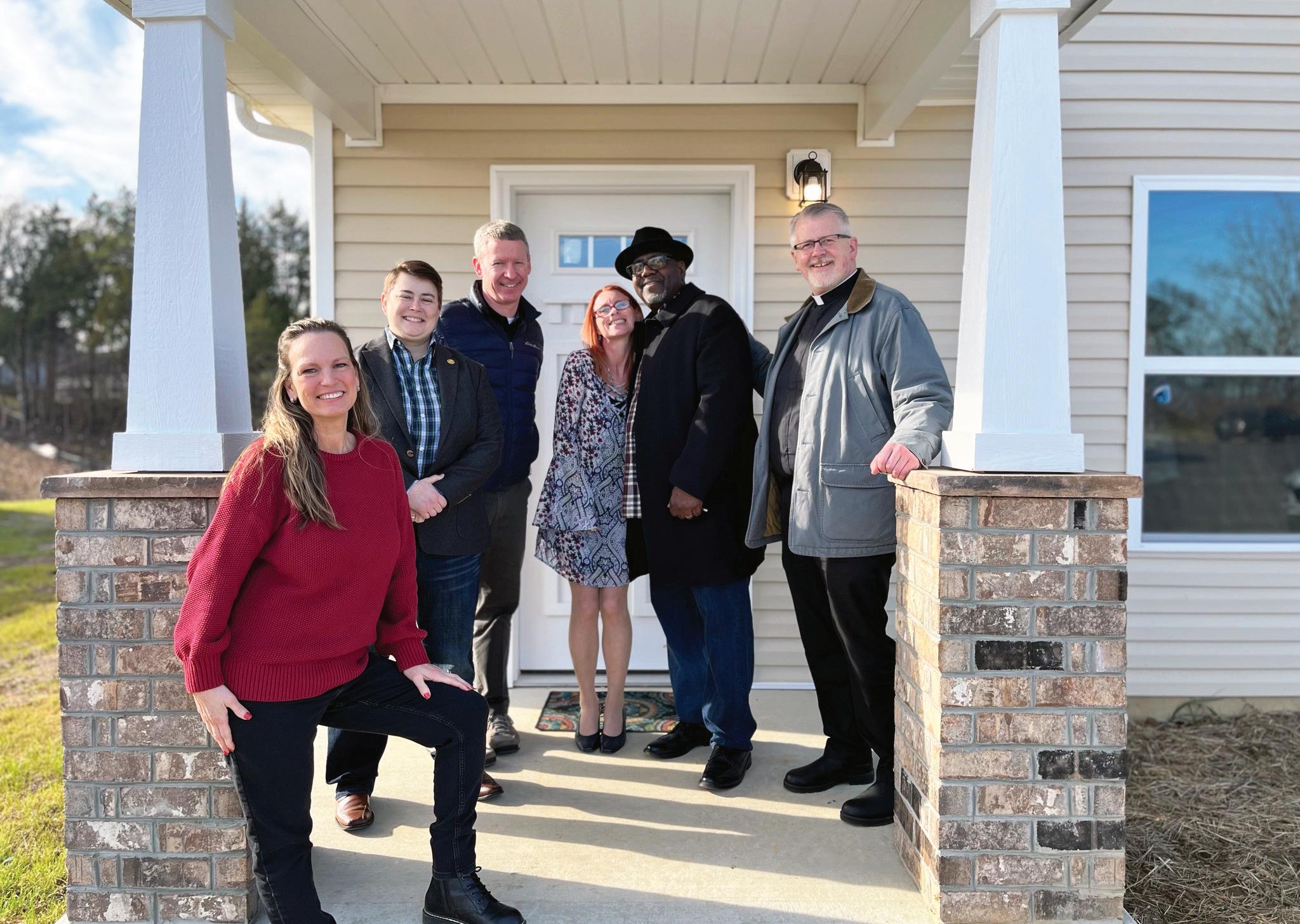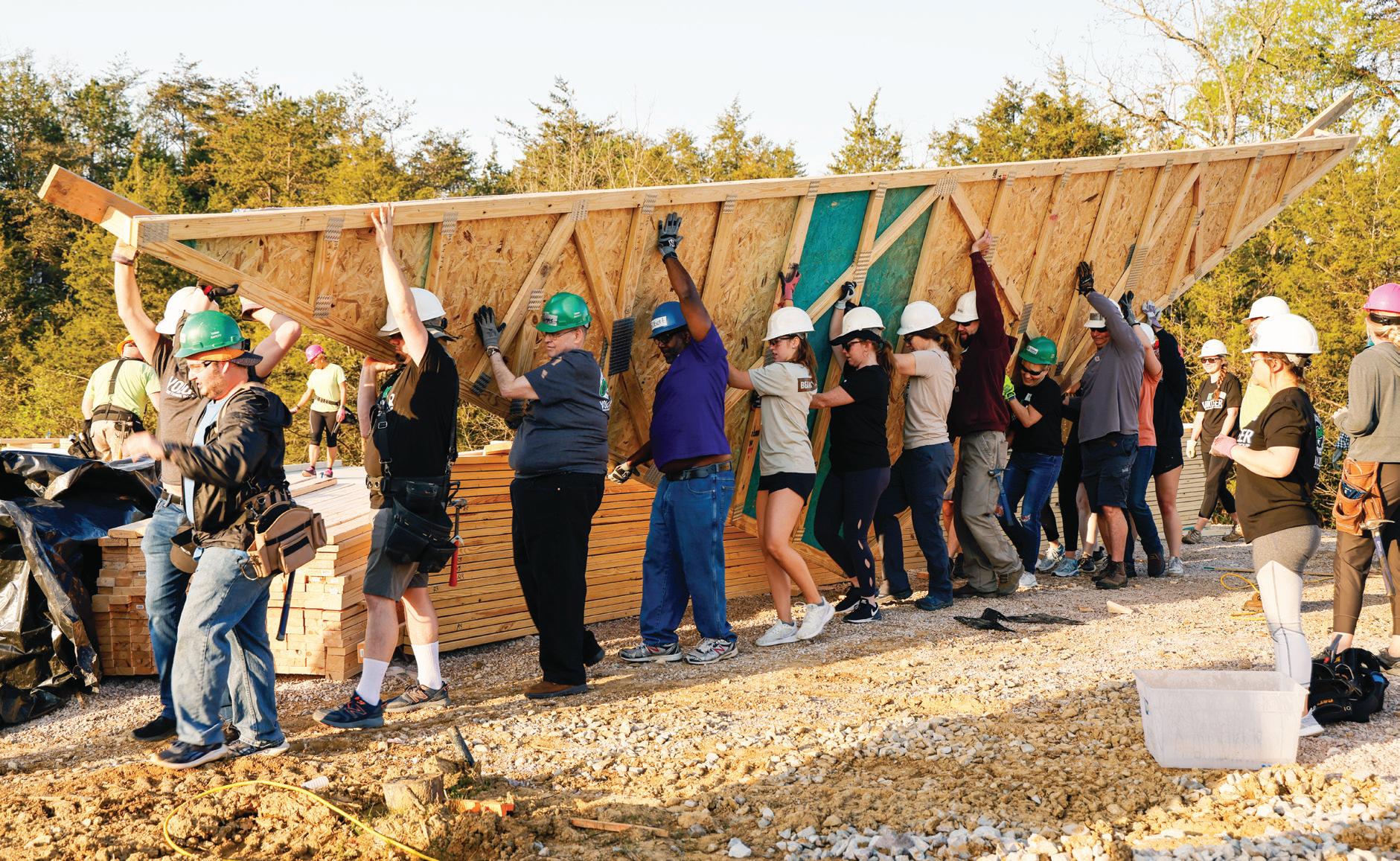
4 minute read
Neighbors helping neighbors
St. John Neumann Parish participates in Habitat for Humanity building project
By Gabrielle Nolan
People say home is where the heart is, and a lot of heart went into a Habitat for Humanity build co-sponsored by St. John Neumann Parish in Farragut.
The project, which involved about 10 parish volunteers, benefits an Army veteran and his wife.
Parishioner Laurel Howanitz initiated the project for the parish.
“I am just all about using your talents that God has given you,” Mrs. Howanitz said. “I just felt like this was something that I could bring to the parish. … Habitat was such a great organization, and I just really felt like it would be a win-win for both.”
“Watching other people volunteer and build this house, it’s just priceless,” she added.
Mrs. Howanitz, who lives in Tennessee and Virginia, has a home in Farragut that is walking distance from St. John Neumann Church.
“We have moved so many times. … This is the second time we’ve been back in Knoxville,” she explained. “I love everything about St. John Neumann.”
‘A perfect marriage’
Once back in Tennessee, a friend of Mrs. Howanitz asked her in 2018 if she was interested in being on the board for Knoxville’s Habitat for Humanity. “So, I got involved in Habitat and I soon realized that … Habitat was the most well-oiled machine with the best volunteers, the best purpose.” success and seeing (our volunteer) doctors go to work with the children and the mothers; talking to the families and having them smile about how much we mean to them.
Participating in multiple Habitat builds, she watched various churches be involved each year.
“I kept thinking, ‘Oh there’s no Catholic church, or there’s no Catholic diocese, or there’s no Catholic presence.’ … I would watch these other churches get involved, and they would be so joyous,” she noted.
“I know it sounds corny, but I would watch their volunteers come out and do this Habitat project, and … they would see the changes that it would make in people’s lives,” she continued.
That is what is missing, and it’s so sad that we can't do that. Even Father David, a priest, is uncomfortable. In fact, there is a state mandate: do not to travel to Haiti. There are massive amounts of kidnapping. We just have to tell folks to stay here, and we are just going to wrestle through it as long as we need to, and one day we will be back down there.
What have you learned about the early days of the ministry and how have you grown over that time?
There has been a lot. Let’s start with medical. That is probably the most visible and the one that is easy to get our arms around. Infant mortality was a significant problem, and it still is throughout the country. I don’t know the percentages, but I know that history tells us that we have made dramatic improvements in infants being born healthier than they were in this remote area of Haiti. And that is a result of people long before me, (Dr.) Jordan Pyda, (Dr.) Dean Mire, Billy Stair, those who made those trips over and over again and helped build that clinic.
We just completed a solar-panel installation (to generate electricity), which is necessary for the government to provide vaccines because those must be refrigerated. That’s a big milestone now that we can get vaccines into that community. We launched a prenatal nutritional program. We had a parishioner who was interested in that area.
So, what that means is that pregnant mothers are often lacking in nutrition. Of course, that affects the pregnancy, and that affects the birth of the child, and that just perpetuates medical problems generation after generation.
So, we focused on prenatal nutri-
Mrs. Howanitz said it was “a natural progression on how the two ideas came together.”
“It’s a perfect marriage because my other tion, meaning while these women are pregnant, can we give them supplemental assistance so that they are more healthy and therefore the child is more healthy? Not just medicine, infant nutrition. So, we are trying to get more preventive versus reactive.
On the educational side, we have two great school facilities there, and we track how the kids do on their standardized testing. (They) do pretty good on a national level. I'd say (they’re) in the top quartile, but we need to get better with our education. That is what will pull Haiti out of where they are. Intelligent, young Haitian kids that say, “I want to make a difference.” Of course, the parish, a new church is just exciting. That is a top priority for the priest there, Father Lamarre. He is all about wanting to get that church built, as most priests are.
Any hope that you can get down to Haiti soon?
We will probably go in a back door. We probably will not go through Port-au-Prince. We will come in another way, perhaps through Mirebalais, which is a larger community with an airport. Or we potentially come in through the Dominican Republic. We were very close to doing that a few months back, and certainly I want to go.
We will have people on the ground there that hopefully and safely can get us to and from. Father David loves going down there as well, and when he is ready to go, I guess I will go with him and see what it's all about. I won’t go until he is ready because he will take a lot more risk than I will with it.
God bless you for all the work you are doing. Thank you.
Listen to the podcast episode at dioknox.org/podcasts. Learn more about the Haiti Outreach Program at https://haitioutreachprogram.org/. ■ love is getting Catholics to feel good about being Catholic and getting involved,” she said.
“It’s great for our parish to have a really good project where they can give back, and maybe it’ll create teamwork and unity and all that kind of good stuff. That was really the whole driving force behind it,” she added.
“There’s a number of things we do, like all the parishes, to serve the community,” said Patrick Wade, director of development for St. John Neumann Church and School. “So, this was obviously a great one … a unique one in that it wasn’t something that we regularly do.”
The makings
of a Habitat home
Multiple organizations work together on a house build to form what is called a covenant partnership.
“We all share in the funds that need to be raised and contributed and the volunteer labor,” Mr. Wade said. Habitat continued on page A11











